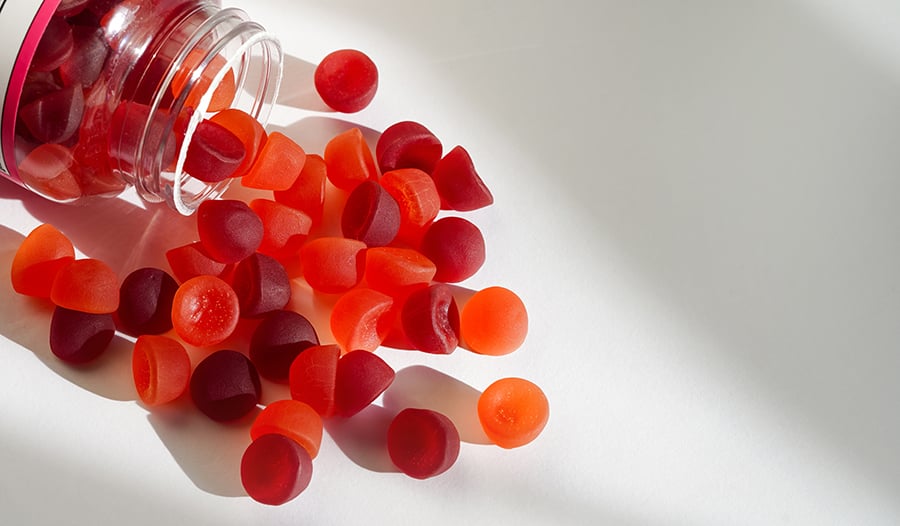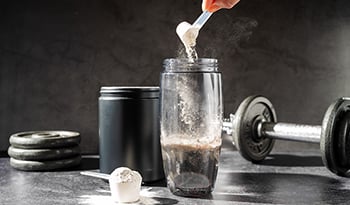Creatine Gummies vs. Powder: Which Is Better?

Creatine has long been one of the most studied and effective supplements for improving strength, power, and muscle growth. Traditionally, creatine powder (in the form of creatine monohydrate) has been the gold standard. However, recently, a new product has started trending — creatine gummies. For athletes, lifters, and everyday gym-goers, the following question is becoming more common: Is there a best form of creatine?
If you’re wondering whether to choose creatine powder or gummies, this article is for you! Read on as we break down the benefits, differences in absorption, convenience, and cost of each to help you decide which is the best form of creatine to take for your goals.
What Is Creatine?
Creatine is a naturally occurring compound composed of three amino acids. While you can get small amounts of creatine from foods like red meat and fish, your body also produces creatine in your liver and kidneys and stores it in the muscles as phosphocreatine.
Creatine helps regenerate adenosine triphosphate (ATP), your body’s primary energy currency during short, explosive movements. Supplementing with creatine increases your muscle stores of the compound, improving strength, power, and recovery. Beyond its benefits for athletic performance, recent research suggests creatine supplementation may also support cognitive function in older adults, facilitate injury recovery, reduce damage from stroke, and preserve muscle mass during weight loss.1
Most studies use creatine monohydrate, the most researched and effective form. When people ask, “What is the best form of creatine?” the answer almost always points to creatine monohydrate, as it’s safe, affordable, and proven to work.
What Are Creatine Gummies?
Creatine gummies are a newer, chewable form of creatine that combines creatine (usually creatine monohydrate) with sugar or sweeteners to create a candy-like delivery. Instead of mixing powder into water or a protein shake, you chew your dose.
How Creatine Gummies Work
Most gummies use the same type of creatine you’d find in powders (creatine monohydrate). Some brands use creatine hydrochloride (HCl), which dissolves more easily but isn’t necessarily more effective. Each gummy usually contains between 1 and 1.5 grams of creatine, meaning you need more than one gummy to hit the standard daily dose of 3 to 5 grams.
Pros of Creatine Gummies
- Convenient and portable: No powder, no mess
- Taste-friendly: Ideal for those who dislike mixing or drinking powders
- Pre-portioned dosing: Easy to track your intake
Cons of Creatine Gummies
- More expensive per serving: Typically two to three times the cost of powder
- Requires multiple gummies: You may need four to six per day to hit the optimal dose
- Added sugars or fillers: Some products include unnecessary ingredients
For people who value simplicity and taste, gummies can be one of the best types of creatine to stick with consistently. They’re also convenient for those who may be hesitant to add another powder to their routine.
Creatine Gummies vs Creatine Powder
So, you’ve decided to try supplementing with creatine, but aren’t sure whether gummies or powder is best? The truth is, both forms work. The right one for you depends on your goals, budget, and behavior when it comes to consistency.
When comparing creatine gummies to powder, consider their key differences in convenience (portability and ease of use), price per serving (overall cost versus efficiency), dietary preferences (flavor and ingredients), and dosage.
Let’s break this down so you know which form of creatine is ideal for your routine.
Convenience
- Gummies: Gummies win on convenience. They’re portable, taste good, and don’t require any mixing or liquid. They’re perfect for travel, gym bags, or people who dislike the chalky texture of powders.
- Powder: Powder requires a shaker or glass, water, and a scoop. While this isn’t a huge hassle, it’s less convenient on the go. However, powders mix easily into protein shakes or smoothies, which some people prefer.
Price Per Serving
- Gummies: Gummies tend to be significantly more expensive per serving, costing two to three times more than powder.
- Powder: Powder is the clear winner in terms of cost. A tub of creatine monohydrate powder is the best form of creatine for budget-conscious athletes.
Dietary Preferences
- Gummies: Some gummies are vegan-friendly and gluten-free, but many contain added sugars or artificial sweeteners. They may also include gelatin (not vegan), so read labels carefully.
- Powder: Most creatine powders, especially pure monohydrate, are vegan, sugar-free, and contain no fillers. If clean ingredients matter to you, powder is usually the better option. That said, some powders may taste chalky or gritty, leading to lower compliance among those sensitive to texture. Powder is a higher barrier to entry for new creatine users.
Creatine Dosage
- Gummies: Each gummy typically contains 1 to 1.5 grams of creatine, so you’ll need multiple per day to hit the research-backed dose of 3 to 5 grams. If you’re a larger or more active athlete consuming upwards of 10 grams daily, that’s 6 to 10 gummies per day.
- Powder: A single scoop usually contains 5 grams. For most people, this makes one scoop of powder an easy way to achieve daily goals.
How To Choose Between Creatine Powder And Creatine Gummies
When deciding which type of creatine is best for your routine, ask yourself:
- Do you value convenience over cost?
- Choose gummies if you want grab-and-go simplicity and don’t mind paying more
- Choose powder if you want the most affordable and ingredient-clean option
- Do you care about added ingredients or extra sugars?
- Go with powder for a cleaner, more customizable option
- Gummies win if taste is your main concern
- Are you consistent with your supplements?
- The best creatine for you is the one you’ll use consistently. Some people are more likely to stick with gummies because they enjoy the taste and ritual.
Ultimately, the best types of creatine for most people remain powders — specifically, pure creatine monohydrate, because of its research support and affordability. For those who need a convenient, taste-friendly way to remember their daily dose, gummies are a great alternative. The best use case for both? Powder at home, gummies on the go!
Side Effects
Creatine is well-studied and safe for most healthy individuals. The side effects are generally the same whether you use powder or gummies, as the creatine source is the same.
Possible side effects of both creatine gummies and powders include
- Water retention (temporary, often in the first few days)
- Mild stomach discomfort (more likely if taken without water or in large doses)
- Weight gain (due to increased muscle water content)2
People using creatine gummies may experience mild digestive upset from added sugars or sugar alcohols. Also, eating multiple gummies daily can add unnecessary calories if you’re on a strict diet.
Final Verdict: Creatine Powder or Gummies?
If your goal is pure performance (and you don’t care about flavor or form), creatine monohydrate powder is the best choice. It’s the most researched, easiest to dose, and most affordable way to get the benefits.
But if you’re the type who forgets their powder, travels a lot, or just needs something easy and enjoyable to stay consistent, gummies can absolutely be worth it. Creatine gummies may be the right choice for people who value convenience, enjoy the taste, or struggle to remember their supplements.
Bottom line? The best creatine for you is the one you’ll actually use every single day. Consistency matters more than form.
References:
- Kreider RB, Stout JR. Creatine in Health and Disease. Nutrients. 2021;13(2):447.
- Dietary Supplements for Exercise and Athletic Performance - Health Professional Fact Sheet. Accessed July 28, 2025.
DISCLAIMER:This Wellness Hub does not intend to provide diagnosis...
















































































 Table of Contents
Table of Contents
















